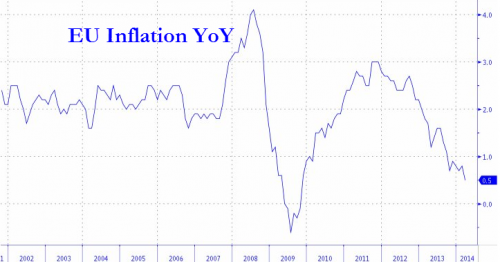Back in October, when European inflation shocked market observers after it tumbled to a then (revised)low of 0.7%, the reaction by the ECB was to shock everyone and lower rates by 25 bps- a completely unexpected move. Earlier today, Europe shocked everyone once again after it reported that annual Eurozone consumer inflation in March tumbled from 0.7% to a paltry 0.5%,the lowest level since November 2009, below already the depressingly low 0.6% forecast, driven primarily by energy costs which tumbled 2.1% courtesy of Japan continuing to export deflation (where are energy costs soaring? Look at the price of natgas in Japan for a hint).


Reuters has more:
Inflation has now been in the ECB’s “danger zone” of below 1 percent for six consecutive months, and the flash reading increases the chances the ECB will cut interest rates when its Governing Council meets on Thursday. Speculation has also grown that it may employ other easing measures such as a negative deposit rate or even U.S.-style bond-buying.
But this year’s late Easter, which has delayed the impact of rising travel and hotel prices at a time when many people go away in Europe, could encourage the euro zone’s central bank to wait until its June meeting to act.
“This will keep the possibility of further monetary policy easing very much alive,” said Nick Kounis, head of economic research at ABN AMRO in Amsterdam. “Nevertheless, the central bank has shown quite some tolerance for low inflation recently.” ECB President Mario Draghi suggested after the ECB’s March meeting that the bank will either do nothing or take bold action should the outlook deteriorate.
He has also said the bank has been preparing additional policy steps to guard against possible deflation, and that the longer inflation remained low, the higher was the probability of deflationary risks emerging.
The relentless weakening trend may focus minds, especially after the head of Germany’s powerful central bank came out to discuss some of the bolder options in more detail, for example pumping more money into the economy via a bond-buying programme.
“There’s still a case for easing, but we don’t think there’s going to be enough agreement within the Governing Council members to ease on Thursday,” said Guillaume Menuet, an economist at Citigroup in London.

